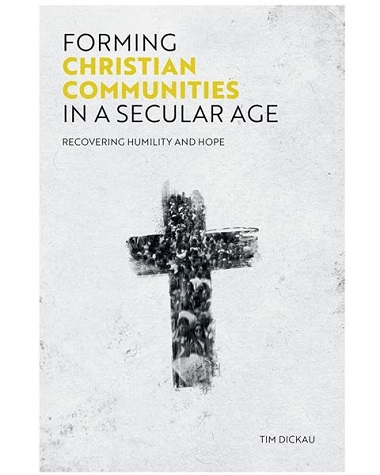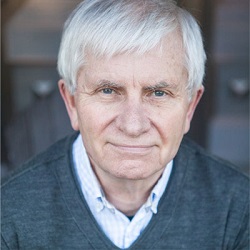 Tim Dickau: Forming Christian Communities in a Secular Age: Recovering Humility and Hope (Tyndale Academic Press, 2021)
Tim Dickau: Forming Christian Communities in a Secular Age: Recovering Humility and Hope (Tyndale Academic Press, 2021)
Tim Dickau has written an important, wide-ranging book about what it means to be God’s people in this time of unraveling and ferment.
The book maps the terrain in which the Euro-tribal churches find themselves and frames a response far more radical than current calls to renewal, planting or reforming.
Tim is thoroughly aware of the crises confronting these churches and so provides us with the heavy lifting of descriptive analysis we need to grasp our situation.
But this book is much more than analysis. If it were only this, we’d be left overwhelmed and discouraged by the heavy realities of this secular age.
Here there is hope to be found, the possibility of discerning a refounding imagination for being God’s people. This is a book that points a way forward, rooted in older monastic traditions that, as Tim shows, have immense practical implications for our situation.
The first part of the book carefully lays out the important work of Charles Taylor’s assessment of our secular age and situation it has created for the churches. Along the way, Tim examines many of the ways this secularity has become the primary narrative of our time (the powers) in terms of such things as its ideologies of progress, individualism, consumerism, neo-liberal globalization, racism and so forth.
Interwoven with these descriptions, however, he begins to play with the place of Christian hope, of the ways in which the subversive nature of the Gospel plays itself out in the life of ordinary Christians in the every day.
Herein lies the book’s power. It is far more than analysis and far more than proposals for change. While these are important elements of the book, its heart is about the power of the Gospel to engage the powers from the perspective of ordinary people in their neighbourhoods. Tim achieves this by enfolding his analysis and proposals into the stories of his own experience in a congregation.
You should pay attention to the important analysis and critical proposals it offers for God’s people becoming participants in the kingdom’s healing of all things in a secular age. Analysis and proposal are critical gifts Tim brings to us in his writing. But I commend this book to you for other reasons as well.
One congregation
First, this book is the witness of someone who has lived in the context of one congregation for 30-plus years. It is the story of a community’s wrestling with the intersections of the secular age and the subversive Gospel.
You are reading the story of someone shaped by long experience on the ground. In these pages you encounter the wisdom of someone who has, in the words of Eugene Peterson, made a long journey in the same direction.
Because of this, you will not receive advice on fixing our churches as they currently exist nor neat technological solutions to the challenges before the church. You are being invited into a combination of the wisdom and experience of someone who has wrestled with these questions of faithful, rooted witness over a long time with the same people. This is what the monastics called stability.
Sacred ground
Second, a corollary to this experience of lived life over time with a people is the rootedness of the book. This is a book about the importance of being and remaining in place. Place is not just a container into which we parachute to ‘plant a church,’ it is the sacred ground within which we thrive.
The discoveries Tim has made over time are a function of his own commitment to his local neighbourhood – to the place where he was planted. The congregation with whom he dwelt wasn’t a project but the hard-lived reality of doing everyday life together.
Because of this, Tim is able to write powerfully about the effects of the secular upon us as Christian communities and the power of the Gospel to form an alternative narrative.
Embodies hope
Third, this is why the book, through all its analysis and reflections, above all else, embodies hope. One is not picking up one more book telling us that if we just do X (pick your method and model) you will fix your church and make it work again. That is not the source of the hope that undergirds this book.
Rather, it is a hope in the reality, the real presence, of God’s Spirit making all things new right in the local. In Tim’s reading of a dire situation, the Spirit is fermenting a different future right in the local.
I read this book with a deep sense of the hope that has formed Tim over these years borne in God’s presence through practices that take us back into the formative traditions of the church and continue to be gifted to us through the new monastic traditions.
At the same time, the hope undergirding this book is not one of just happy stories that play well in sermons. Tim is careful to describe this journey in terms of pain and cost, his own coming to terms with his brokenness. The Cross looms large through this book. Tim is real about the costs of this transformation. One confronts the hard, grounded reality of our humanness in this book.
Bigger picture
Fourth, Tim is offering us a bigger picture of God’s purposes than the church. His stories are not what I would call congregation-centred. They are not driven by the narrative of ‘if we just get church right, we’ll be well again.’ The bigger picture of how we are God’s people in this secular age has to do with being in, being with and being for the neighbourhood where we dwell.
Pastoral role
Fifth, through this grounding in the local and everyday over a long time, Tim comes to his reading of critical thinkers in our time. People like Charles Taylor, Terry Eagleton, Willie Jennings and a host of others populate this book.
But what makes the book helpful and practical is how Tim brings these thinkers into the conversation not from the desk of an academic but the role of local pastor who, every day, is asking how it all lands among the people with whom he lives. As you engage with these thinkers, let Tim be a pastor to you and invite you into these important ideas for the sake of kingdom life where you dwell.
Monastic ways
Finally, this book is filled with practical help on how the traditions of monasticism can become the pathway into discerning the shape of God’s people in this secular age. I think Tim is absolutely right in his assessment that it will be in our rediscovery of these practices and ways of being a people that begins the refounding of local communities of God’s people as the hermeneutic of the Gospel.

Alan Roxburgh
Alan J. Roxburgh is known around the world as a pastor, teacher, writer and consultant in missional formation and church leadership. He says on his personal website:
After many years of traveling around the world I am laying that down to dwell in the part of Vancouver, Canada where I live in an extended household with my wife Jane and others. I love hiking in the mountains, biking, cooking, drinking great coffee in the Pacific North West and hanging out with our grandchildren.
Roxburgh founded and consults with TMN (The Missional Network) and has written many books, including Leadership, God’s Agency and Disruptions (2021, with Mark Lau Branson), The Missional Leader (2020, with Fred Romanuk), Practices for the Refounding of God’s People (2018, with Martin Robinson) and Joining God, Remaking Church, Changing the World (2015).

Kudos to Tim for this further labour of love in the service of the local, wider and ecumenical church or Body of Christ!
I know a fair bit of blood, sweat and tears went into this outcome; patience, persistence and perspective.
Now, I look forward to the read, viewing of its right-brain sketches, the anticipated vast bibliography, the lures of the endorsements which I will surely compare with my own and wondering, too, which themes are on the burner for Tim now to address.
In shalom . . . Barry Morris